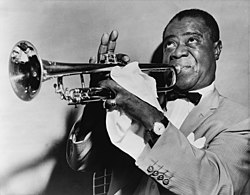Classical variations and recordings
In the late 19th century African-American music began to appear in classical music art forms, in arrangements made by Black composers such as Samuel Coleridge-Taylor, Henry Thacker Burleigh and J. Rosamond Johnson. Johnson made an arrangement of "Nobody Knows the Trouble I See" for voice and piano in 1917, when he was directing the New York Music School Settlement for Colored People. [6]
The song was released on the extended play Negro Spirituals Vol. 1 (His Master's Voice 7EGN 27), and the song was arranged by Harry Douglas.
American contralto Marian Anderson had her first successful recording with a version of the song on the Victor label in 1925. [7]
Singer Lena Horne recorded a version of the song in 1946. [8]
Florence Price incorporates "Nobody Knows the Trouble I've Seen" in her Mississippi River Suite of 1934. The second section especially quotes directly from the spiritual; and it dominates the texture of the fourth section. [9]
American violinist Maud Powell was the first white solo concert artist to perform classical arrangements of spirituals in concerts, and that is where she also interpreted classical and contemporary pieces by composers like Dvorak and Sibelius. After Powell's suggestion, J. R. Johnson made an arrangement of "Nobody Knows the Trouble I See" for piano and violin in 1919. Powell got to play this in a fall program she organized, and then she died that November. [6] Recent interpretations of the classical version of this spiritual have been made by a Chicago violinist, Rachel Barton Pine, who has been working along the lines of Powell's legacy. [10]
The Deep River Boys recorded their version in Oslo on August 29, 1958.
Bing Crosby included the song in a medley on his album 101 Gang Songs (1961).
Dr. John covered the song on his album Ske-Dat-De-Dat: The Spirit of Satch (2014).
This page is based on this
Wikipedia article Text is available under the
CC BY-SA 4.0 license; additional terms may apply.
Images, videos and audio are available under their respective licenses.
